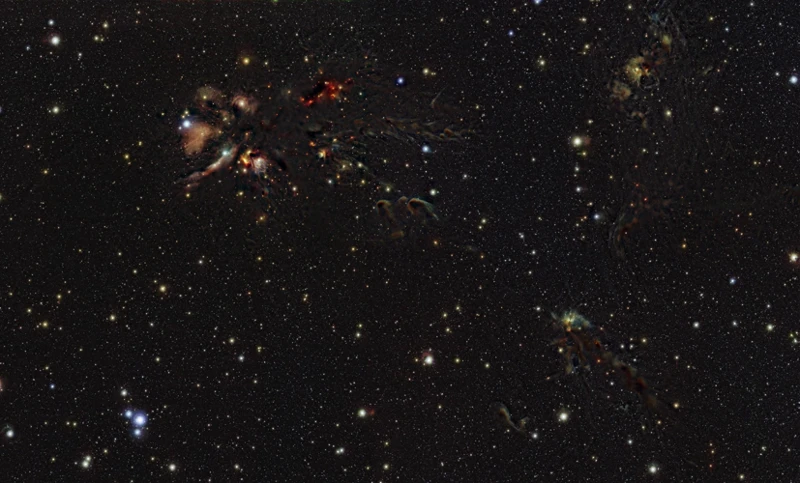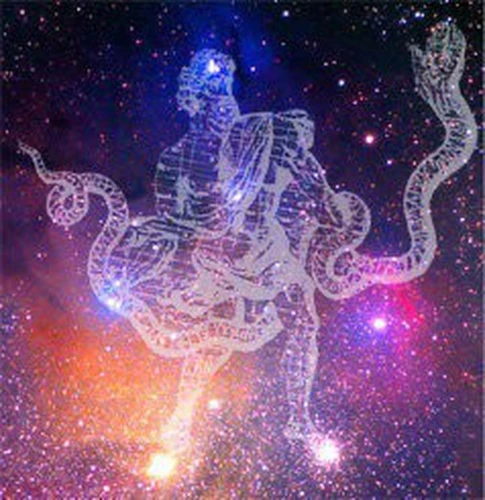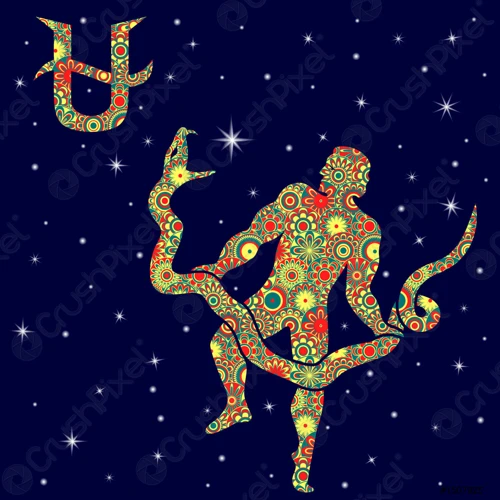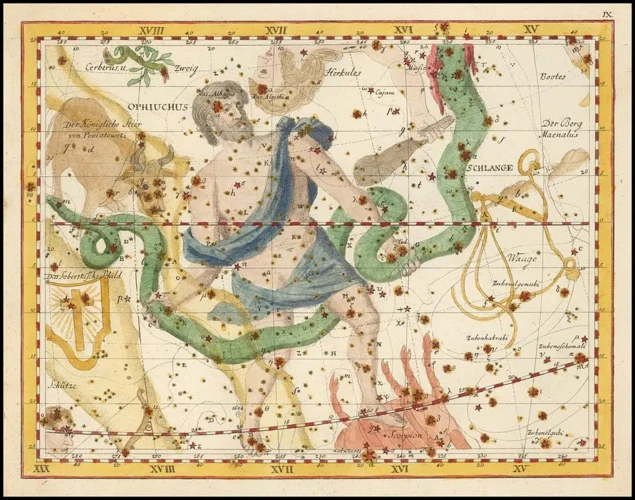We’ve all heard about the twelve signs of the zodiac, those celestial titles that determine our personality traits and future outcomes. But have you ever wondered why there seems to be a hidden thirteenth sign? Enter the Ophiuchus Mystery. This captivating enigma delves into the exclusion of the Ophiuchus constellation from the traditional zodiac, leaving many to question its origins, astrological significance, and the factors that led to its exclusion. Join us on a journey as we unravel the peculiar tale of Ophiuchus and explore its hidden secrets that have perplexed astronomers and astrologers for centuries.
The Zodiac

The zodiac is a fascinating concept that has captivated humanity for centuries. It refers to a band of the sky divided into twelve equal parts, each named after a specific constellation. These constellations are known as the astrological signs and hold great importance in determining human traits and predicting future events. From self-assured Aries to compassionate Pisces, each sign offers a unique set of characteristics and qualities. However, hidden within this well-known framework lies the tantalizing mystery of Ophiuchus, the thirteenth sign that challenges our understanding of the zodiac. To dive deeper into this celestial enigma, check out our article on Ophiuchus: The Divine Healer of the Zodiac.
Definition and Importance
When we talk about the definition and importance of the zodiac, we are referring to the system that divides the sky into twelve equal parts, each named after a specific constellation. These twelve constellations, or astrological signs, have been a fundamental part of various cultures and belief systems throughout history. The zodiac holds great significance in astrology, as it is believed to influence a person’s personality traits, relationships, and even their destiny. Each sign is associated with specific qualities, characteristics, and ruling planets, providing individuals with insight into their strengths, weaknesses, and potential life paths. While the traditional zodiac has been widely accepted and followed, the exclusion of Ophiuchus raises questions about the completeness and accuracy of the system. To explore the intriguing elements of Ophiuchus and how it may impact your own birth chart, take a look at our article on Exploring Ophiuchus: The Birth Chart Revealing You.
The Ophiuchus Constellation

The Ophiuchus constellation holds a mysterious allure that sets it apart from the traditional zodiac signs. Situated between Scorpio and Sagittarius, this constellation features the image of a serpent bearer. The name Ophiuchus is derived from Greek mythology, where it represents the healer Asclepius. Its symbol is often depicted as a man holding a serpent, symbolizing healthcare and transformation. Ophiuchus is known for its notable stars, including Rasalhague and Sabik, which add to its celestial beauty. To delve deeper into the untold secrets and enigma surrounding the thirteenth sign, make sure to check out our article on Demystifying Ophiuchus: The Enigma and Untold Secrets of the 13th Sign.
Overview and Characteristics
The Ophiuchus constellation, often referred to as the “Serpent Bearer,” is a fascinating part of the celestial landscape. Located near the celestial equator, it stretches across the expansive night sky. Ophiuchus is depicted as a man holding a snake, with the snake coiled around his body. This constellation is comprised of several bright stars, including Rasalhague and Sabik, which add to its allure.
In terms of its characteristics, Ophiuchus is associated with healing and wisdom. Those born under this constellation are believed to possess a deep sense of intuition and a desire to help others. They are often seen as natural healers, with the ability to bring solace to those around them. Individuals influenced by Ophiuchus are said to have an innate curiosity and a thirst for knowledge, constantly seeking to expand their understanding of the world.
While Ophiuchus may not have the same widespread recognition as the traditional zodiac signs, those who align with this constellation have their own unique set of traits and strengths. Exploring the intricacies of Ophiuchus further unveils a segment of the cosmic puzzle that has long been overlooked. To uncover more about Ophiuchus and its impact on astrology, continue reading our article on Exploring Ophiuchus: The Birth Chart Revealing You.
The History of Zodiac Signs

The history of zodiac signs dates back thousands of years and is steeped in rich cultural and astrological traditions. The origins can be traced to ancient civilizations such as Babylon and Greece, where these celestial markers played a significant role in understanding the human condition and predicting cosmic events. The Babylonian zodiac, established around the 2nd millennium BCE, consisted of twelve signs based on the constellations that appeared along the elliptic. These signs would later influence the Greek zodiac, further solidifying the association between the stars and human destinies. Explore the captivating journey of the zodiac signs and their historical significance by delving into our article on Demystifying Ophiuchus: The Enigma and Untold Secrets of the 13th Sign.
The Babylonian Zodiac
The Babylonian Zodiac holds a significant place in the history of astrology. Dating back to the ancient civilization of Mesopotamia, the Babylonians were among the first to develop a system of astrological signs. Their zodiac consisted of twelve constellations, each associated with a specific month of the year. These constellations included familiar names such as Taurus, Leo, and Scorpio. The Babylonians believed that the position of these constellations at the time of an individual’s birth influenced their personality and destiny. In addition to the twelve signs, the Babylonians also recognized a thirteenth constellation called Ophiuchus, depicting a serpent bearer. Interestingly, this early inclusion of Ophiuchus in the Babylonian Zodiac raises questions about its later exclusion from the more widely accepted Greek Zodiac. Delving into the mysteries of the Babylonian Zodiac provides valuable insights into the origins of astrology and the fascinating relationship between celestial patterns and human life.
The Greek Zodiac
The Greek Zodiac holds a significant place in the history of astrology and the development of the zodiac signs. In Greek mythology, the twelve signs were associated with various gods and goddesses, each representing different aspects of life. Aries, the Ram, represented by the god Ares, symbolized courage and leadership. Taurus, the Bull, represented by the god Zeus in the form of a bull, signified strength and stability. Gemini, the Twins, associated with the twin gods Apollo and Hermes, represented duality and communication. Cancer, the Crab, linked to the water element and represented by the goddess Hera, symbolized emotions and protection. Leo, the Lion, associated with the lion-slaying hero Heracles, represented power and charisma. Virgo, the Virgin, associated with the goddess of harvest, Demeter, represented purity and attention to detail. Libra, the Scales, represented by the goddess Themis, symbolized balance and justice. Scorpio, the Scorpion, associated with the goddess Artemis and the giant scorpion she sent to kill Orion, signified intensity and transformation. Sagittarius, the Archer, represented by the centaur Chiron, symbolized adventure and wisdom. Capricorn, the Sea-Goat, associated with the god Pan, represented ambition and discipline. Aquarius, the Water Bearer, represented by the god Ganymede, symbolized innovation and humanitarianism. Finally, Pisces, the Fish, linked to the sea goddess Aphrodite and her son Eros, represented compassion and sensitivity. The Greek Zodiac not only provided a framework for understanding human personalities but also played a role in mythological storytelling and cultural beliefs.
The Ophiuchus Controversy

The Ophiuchus Controversy is a perplexing topic that has stirred debates among astronomers and astrologers alike. Its origins can be traced back to ancient times, where the constellation Ophiuchus, also known as the Serpent Bearer, was identified and recognized for its unique positioning in the sky. This celestial figure showcases a man holding a serpent, symbolizing wisdom, healing, and transformation. However, when it comes to its astrological significance, opinions diverge. Some argue that Ophiuchus should be included as the thirteenth zodiac sign, disrupting the established twelve. Others believe that the exclusion of Ophiuchus was intentional due to various factors such as the tidy division of the year into twelve equal parts. To explore the hidden secrets and enigmatic nature of Ophiuchus, delve into our article on Demystifying Ophiuchus: The Enigma and Untold Secrets of the 13th Sign. Discover the controversies, myths, and alternative perspectives surrounding this intriguing constellation.
Origins of Ophiuchus
The origins of Ophiuchus, the thirteenth sign of the zodiac, trace back to ancient Greek mythology. Ophiuchus is associated with the figure of Asclepius, the Greek god of medicine and healing. According to the myth, Asclepius was a skilled healer who possessed the ability to bring the dead back to life. This extraordinary power alarmed the gods, who feared that it would disrupt the natural order of life and death. Consequently, Zeus, the king of the gods, struck Asclepius down with a lightning bolt, killing him instantly. As a tribute to his exceptional healing abilities, Zeus placed Asclepius in the sky as the constellation Ophiuchus, represented by a man holding a serpent. This serpent is often associated with the symbol of medicine, the Rod of Asclepius. Ophiuchus symbolizes healing, wisdom, and ancient knowledge, reflecting its mythological origins as the divine healer. The intriguing lore behind Ophiuchus adds an enchanting layer to the zodiac, inviting curiosity and fascination among those seeking to unravel its mystique.
Astrological Significance
The astrological significance of Ophiuchus sparks intrigue and fascination among astrologers and enthusiasts alike. As the thirteenth sign, Ophiuchus represents a profound shift in traditional astrology. Those born under this sign are believed to possess traits such as wisdom, healing abilities, and a deep connection to spirituality. Ophiuchus is often associated with the archetype of the healer or the seeker of knowledge. Individuals under this sign are thought to be natural-born healers and possess a strong intuition that allows them to navigate the complexities of life. While Ophiuchus may be omitted from traditional horoscopes, many believe that integrating this powerful sign into astrology can provide a more accurate and comprehensive understanding of an individual’s astrological profile. To explore the hidden depths of Ophiuchus and uncover how it influences your birth chart, take a look at our insightful article on Exploring Ophiuchus in Your Birth Chart: Revealing the Real You.
The Exclusion of Ophiuchus

The exclusion of Ophiuchus from the zodiac is a topic that has sparked much debate and intrigue. Many people wonder why this constellation, with its rich history and astrological significance, was overlooked and omitted from the traditional twelve signs. The factors and debates surrounding its exclusion have given rise to various theories and explanations. Some believe it was a matter of simplification, as incorporating Ophiuchus would have disrupted the symmetry and balance of the zodiac system. Others argue that the exclusion was a deliberate decision influenced by cultural and historical factors. Whatever the reasons may be, the absence of Ophiuchus has had a lasting impact on astrology, prompting experts and enthusiasts to delve into its rediscovery and reinterpret its meaning. To explore more about the enigma surrounding Ophiuchus, read our article on Demystifying Ophiuchus: The Enigma and Untold Secrets of the 13th Sign.
Factors and Debates
The exclusion of Ophiuchus from the zodiac has been a subject of intense debate and controversy among astronomers and astrologers. Several factors have contributed to the ongoing discussion surrounding its inclusion. One of the main factors is the historical alignment of the zodiac with the seasons. The twelve traditional zodiac signs correspond to the twelve months of the year. Ophiuchus, however, disrupts this neatly organized system, leading some to argue against its inclusion. Another factor is the precision and accuracy of the zodiac calculations. In ancient times, the zodiac was defined based on the positions of the constellations in relation to the Earth. Over time, these positions have shifted due to the Earth’s axial precession, raising questions about the validity of including Ophiuchus as a thirteenth sign. Additionally, the debate surrounding Ophiuchus revolves around the impact it would have on astrological predictions and interpretations. Would the addition of a thirteenth sign change the way astrologers interpret birth charts and horoscopes? These factors and debates continue to fuel the intrigue and controversy surrounding the exclusion of Ophiuchus from the zodiac. For more insights on the enigmatic Ophiuchus constellation and its impact on astrology, read our article: Demystifying Ophiuchus: The Enigma and Untold Secrets of the 13th Sign.
Impact on Astrology
The inclusion or exclusion of Ophiuchus from the zodiac has had a significant impact on astrology. For centuries, astrologers have relied on the traditional twelve signs to interpret birth charts, make predictions, and provide guidance to individuals seeking insight into their lives. The sudden introduction of a thirteenth sign disrupts this established system and raises questions about the accuracy and validity of astrological readings. Astrologers and enthusiasts alike have debated the incorporation of Ophiuchus into astrological practices, with some arguing for its inclusion and others advocating for the preservation of the original twelve signs. This controversy has led to fragmentation within the astrological community, with some adherents embracing Ophiuchus while others vehemently reject it. As a result, astrologers now face the challenge of reconciling the energies and meanings associated with Ophiuchus with the existing interpretations of the twelve signs. The impact of Ophiuchus on astrology extends not only to individual birth charts but also to the broader understanding of celestial influences on human life. It challenges astrologers to expand their knowledge and adapt their practices to incorporate this additional sign. Whether Ophiuchus will be widely embraced and integrated into mainstream astrology or remain a divisive topic, its discovery has undeniably left a lasting impact on the field, encouraging astrologers to explore new possibilities and reconsider established frameworks.
Rediscovering Ophiuchus
In recent years, there has been a resurgence of interest in rediscovering Ophiuchus and exploring its significance in astrology. Modern perspectives and interpretations have shed new light on this elusive constellation, sparking debates and discussions among astrologers and enthusiasts alike. Some argue that Ophiuchus should be considered as a valid zodiac sign, attributing it with unique characteristics and traits. Others view it as a celestial entity that adds an additional layer of complexity to the existing twelve signs. To delve into the fascinating world of Ophiuchus and its implications in astrology, don’t miss our article on Demystifying Ophiuchus: The Enigma and Untold Secrets of the 13th Sign. Prepare to embark on a journey of discovery as we unravel the mysteries surrounding Ophiuchus and its place in the intricate tapestry of the zodiac.
Modern Perspectives and Interpretations
Modern perspectives and interpretations of Ophiuchus have emerged in recent years, shedding new light on this mysterious constellation and its significance in astrology. While Ophiuchus is not officially recognized as a zodiac sign in mainstream astrology, some alternative astrologers and enthusiasts have embraced it as an additional sign, expanding the traditional zodiac from twelve to thirteen. These advocates argue that Ophiuchus brings balance and complements the existing signs, offering a new dimension to astrological readings and personality analysis.
According to modern interpretations, Ophiuchus is often associated with healing, wisdom, and transformation. Individuals born under this sign are believed to possess great intuition, a deep connection to spirituality, and an innate ability to heal others. They are seen as natural healers, seekers of knowledge, and catalysts for personal growth and transformation. Ophiuchus is also thought to symbolize the blending of the physical and spiritual realms, encouraging individuals to embrace their spiritual journey while remaining grounded in the material world.
It is important to note that the inclusion of Ophiuchus in astrology remains a controversial topic. While some astrologers argue for its inclusion based on astronomical and symbolic considerations, others maintain that the traditional twelve zodiac signs are sufficient and that the addition of Ophiuchus would disrupt the established system. As with any aspect of astrology, interpretations and beliefs can vary greatly among individuals, and it ultimately comes down to personal choice and preference.
Modern perspectives and interpretations of Ophiuchus introduce a new dimension to astrology, presenting it as a potential thirteenth zodiac sign. With its associations of healing, wisdom, and transformation, Ophiuchus offers a unique perspective on personality traits and life journeys. While its inclusion in astrology remains a subject of debate, it has undoubtedly piqued the interest of those seeking a broader understanding of the zodiac and the cosmic forces that influence our lives.
Conclusion
Drawing our exploration of the Ophiuchus Mystery to a close, we find ourselves pondering the significance of this celestial enigma. The exclusion of Ophiuchus from the traditional zodiac has sparked debates and curiosity among astronomers, astrologers, and enthusiasts alike. While its origins can be traced back to the ancient Babylonian and Greek civilizations, the true astrological importance of Ophiuchus remains a subject of speculation. The factors that led to its exclusion are somewhat murky, with suggestions ranging from the limited number of days in a year to the alignment of the zodiac with equinoxes. The impact of Ophiuchus’ exclusion on astrology also remains a point of debate, with some arguing that its inclusion could reshape the interpretations and predictions associated with each sign. In recent times, there has been a resurgence of interest in Ophiuchus, as modern perspectives and interpretations attempt to shed light on its hidden secrets. Whether you believe in the power of astrology or not, the Ophiuchus Mystery serves as a reminder of the vastness and complexity of the universe we inhabit. Its exclusion from the zodiac leaves us with lingering questions and a sense of curiosity that will continue to spark intrigue for generations to come.
Frequently Asked Questions
What is astrology and how does it relate to the zodiac?
Astrology is the belief that the positions and movements of celestial bodies can influence human behavior and events on Earth. The zodiac is a key component of astrology, as it divides the sky into twelve sections based on specific constellations.
Why are there only twelve zodiac signs?
The number twelve is deeply rooted in ancient civilizations and holds symbolic significance. The twelve signs correlate with the twelve months of the year, the twelve hours on a clock, and the twelve apostles in Christianity, among other examples.
What are the characteristics associated with each zodiac sign?
Each zodiac sign is associated with certain traits and qualities. For example, Aries is known for its assertiveness and leadership skills, while Libra signifies balance and harmony. These characteristics provide insights into an individual’s personality.
Why was Ophiuchus excluded from the zodiac?
The exclusion of Ophiuchus from the zodiac can be attributed to various historical and astrological factors. These factors range from the unique positioning of Ophiuchus in relation to other constellations, to disagreements among astrologers about its significance.
What does Ophiuchus represent astrologically?
Astrologically, Ophiuchus is associated with healing, wisdom, and transformation. Those born under this sign are said to possess great knowledge and have a deep desire to help others, making them natural healers.
How has the exclusion of Ophiuchus impacted astrology?
The exclusion of Ophiuchus has sparked debates and discussions within the astrological community. Some argue that including Ophiuchus would disrupt the established system, while others believe it could enhance astrological interpretations and provide a more comprehensive understanding of individuals’ personalities.
Is there scientific evidence supporting astrology?
While astrology is not considered a science in the traditional sense, there is ongoing research exploring the potential correlations between celestial events and human behavior. However, it is important to note that the scientific community remains divided on the validity of astrology.
What modern perspectives and interpretations have emerged regarding Ophiuchus?
In recent years, there has been a resurgence of interest in Ophiuchus, with some astrologers incorporating it into their practice. New interpretations suggest that Ophiuchus represents a gateway to spiritual growth and personal transformation.
Can I change my zodiac sign to Ophiuchus if I feel it resonates with me?
While you cannot change your assigned zodiac sign, you can explore how the characteristics associated with Ophiuchus align with your own traits. Remember, astrology is a tool for self-reflection and personal growth, and you are not limited to the traits of your assigned sign alone.
Are there other astrological systems that incorporate Ophiuchus?
Yes, there are astrological systems, such as the sidereal zodiac, that recognize and include Ophiuchus as a thirteenth sign. These alternative systems provide different perspectives on the zodiac and offer additional insights into astrology.








